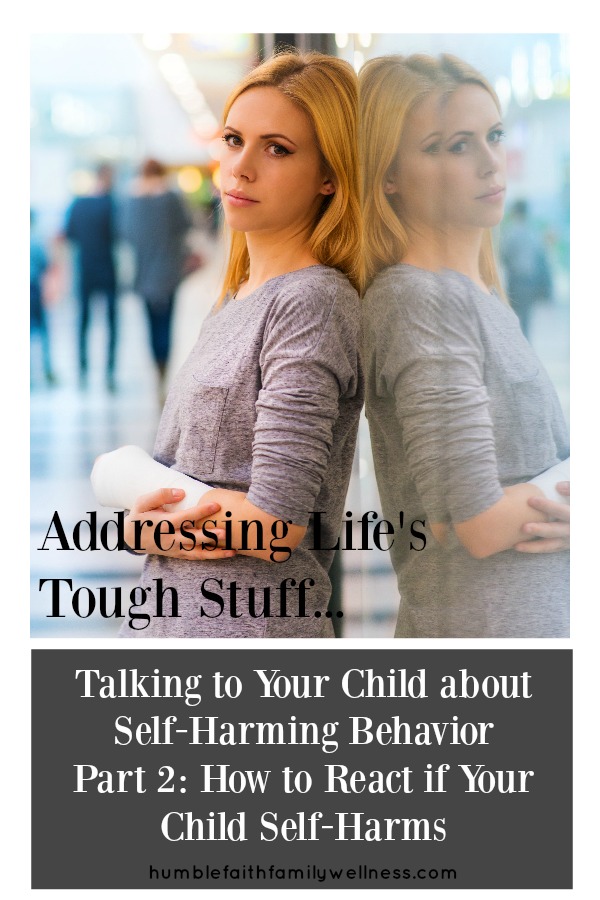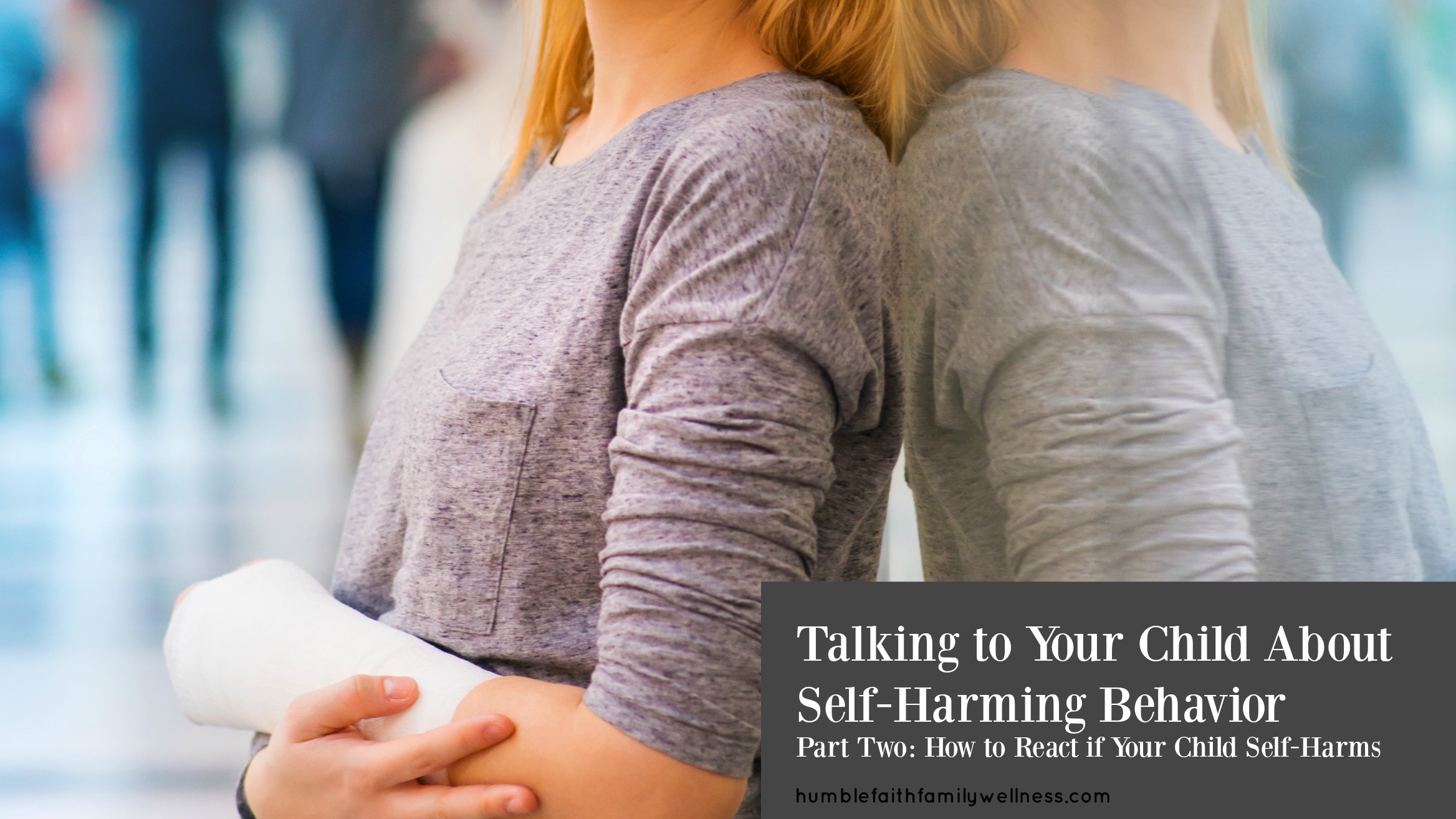
This is part two of our self-harming behavior posts and part of the larger series ‘addressing the tough stuff’. In part one, I focused on the understanding of why self-harming happens. In this post, I will address how to react if your child is engaging in self-harming behavior.
Here’s a list of other tough stuff topics that I have addressed or will be in the future:
- How to talk to your kids about sex
- Talking to your child about inappropriate touching.
- Talking to your child about pornography
- Self-harming Part 1 – Understanding why it happens
- Self-harming Part 2 – How to react if your child self-harms
- Suicide Part 1 – How to explain suicide to your child
- Suicide Part 2 – As a parent how to react if your child is suicidal
- Talking to your teens about drinking
- Talking to your teens about drugs
- How to teach your teens to follow their values – Part One
- How to teach your teens to follow their values -Part Two …And not be judgmental
Envisioning yourself as a parent ever having to deal with your child purposefully harmed themselves is probably a terrifying and sickening thought.
I recognize that and I’m sorry to elicit those emotions in you.
At the same time, it is so important that you are equipped to handle this situation if it ever arises. I pray that it never arises.
Stay Calm
I assure you, this would not be your natural response. Your natural response would be to freak out a bit. Fear mixed with confusion often turns to anger.
I promise you yelling is not beneficial in this situation. It only leads to increased shame by the child. And a greater feeling that they can’t talk to you about their emotions and thoughts.
But there is also a concern of responding too empathetically. Providing an increased response of compassion, support, and love at the moment may reinforce the secondary gain of attention.
Meaning, if the child was struggling with feeling loved and cared for, the increased emotional response from the parents and/or friends, may actually increase and reinforce the desire to self-harm. The faulty thought process being that self-harming is a way to receive love.
Emotionally Neutral
This means responding in a matter-of-fact way. Calmly assess the wound, get it cleaned, and bandaged. And that’s it. Let your child know you will have a more in-depth conversation later when you have had time to process, talk with your spouse, and pray.
At the moment is not the time for a big heart to heart. Unless you and your child routinely have the heart to heart conversations, we don’t want to provide secondary gain as explained above.
Don’t punish
Do not punish your child for self-harming behaviors! I can’t stress this enough.
The reason for self-harming is due to not knowing how to handle and manage their emotional distress in another way. (Understanding why self-harming happens is discussed in detail in part one.)
While misguided and unsafe, self-harming is rarely done out of direct opposition to the parents.
It is, however, important to take the object used to self-harm and to search the bedroom for other such objects. (It is not uncommon for children who actively engage in self-harming behaviors to have ‘tools’ in multiple places.) This is to be explained as a way to keep your child safe. Again, not as a punishment.
After the fact – Discuss why self-harming behavior happened
Now that the immediacy of the moment has passed. Whether later that day or the next day, make sure you do have that in-depth conversation.
Ask what’s been going on – and listen.
Ask how long they have been self-harming – and listen.
Ask where they learned about self-harming or how it first started – and listen.
Do you notice a pattern? This conversation is about your child. Allowing them the opportunity to be heard and to just listen to what they have to say.
This is not the time for lectures. Or even problem-solving. This conversation is about information gathering and reinforcing for your child that you care.
Increase scheduled connection time with your child
After that conversation, it’s time for self-reflection. How has your interaction and connection been with your child lately? (I do not bring this up to blame. Please don’t read it that way.) I am just saying they may need more of you. Even if you were not at all a reason why they self-harmed in the first place. They may need more of your love and support.
Find ways to connect and spend quality one-on-one time with your child that is regularly scheduled.
Seek support
As I described in part one, self-harming behavior can quickly turn addictive. Please find a mental health professional to help your child (and you) navigate this situation.
My role as the therapist is to help the child understand why it happened. That usually includes breaking down a whole lot of lies and building up self-worth. Identifying the triggers that led to the self-harming behavior. And ways to more appropriately handle and manage the emotional distress.
And that process takes time, unconditional love, and prayer.
I pray this post helps you to feel equipped to help your child if they are engaging in the self-harming behavior.
Also please let me know in the comments below of any other “tough stuff” topic you would like me to address to help you have discussions with your children.
God bless!
Melissa
p.s. Check out all of the beautiful sites I link up with!
*Disclosure: This post may contain affiliates. Read the full disclosure here.

My little sister self harmed a few years ago. I wish my mum had this advise available to her then.
I’m so sorry to hear that your little sister went through this pain. I pray she received the help and support necessary. Thank you for stopping by and sharing your experience. God bless!
Thank you for posting this. As someone who has struggled with self harm and has seen this in others, I think you approached it beautifully. Not over-reacting and taking time to get to the root of the issue from a Godly perspective is so important.
It is something that touches many people. My prayer is that this post can help support parents (and ultimately their children) in how to seek help and healing. Thank you for stopping by and sharing your experience. God bless!
I work with college students and this is helpful advice for that realm too. I appreciate you addressing these “tough” topics. Thanks!
Yes, this would absolutely work in that capacity as well! I’m glad you found the post beneficial. Thank you for stopping by and God bless!
Thank you for giving us tips on how to deal with it. What is the statistics around self-harming? What percentage of kids are doing it?
I remember a few girls doing it when I was in school but haven’t heard of any cases currently.
Unfortunately, each year, 1 in 5 females and 1 in 7 males engage in self injury. (I have more stats and sources in part one.) But the concern is that statistic may actually be higher as many individuals who self-harm don’t report it or get found out.
Melissa, thank you for writing about this topic and sharing counsel for parents and other adults. This may sound like a strange question, but is overeating related to self harm? Just wondering that from my own personal experience.
That is not a strange question Christina. Overeating can be a form of self-harm depending upon the emotional intent. When overeating is associated with shame (due to eating issues or otherwise) it can turn into a form of punishment and harm. I discuss this more in my post about emotional eating. https://humblefaithfamilywellness.com/understanding-emotional-eating-cycle/ Thank you for stopping by and sharing your question. God bless!
I really like the steps. I think this is something I can use in any hard parenting situation!
Yes, these steps can be tailored to most any hard parenting situation. Staying calm and remaining emotionally neutral generally helps our children to feel safe and secure enough to express what they are experiencing. Thank you for stopping by and sharing your thoughts. God bless!